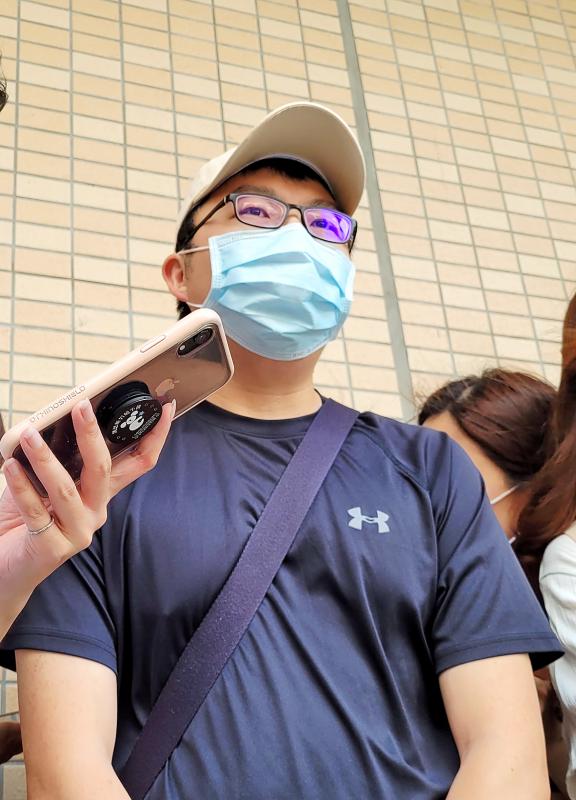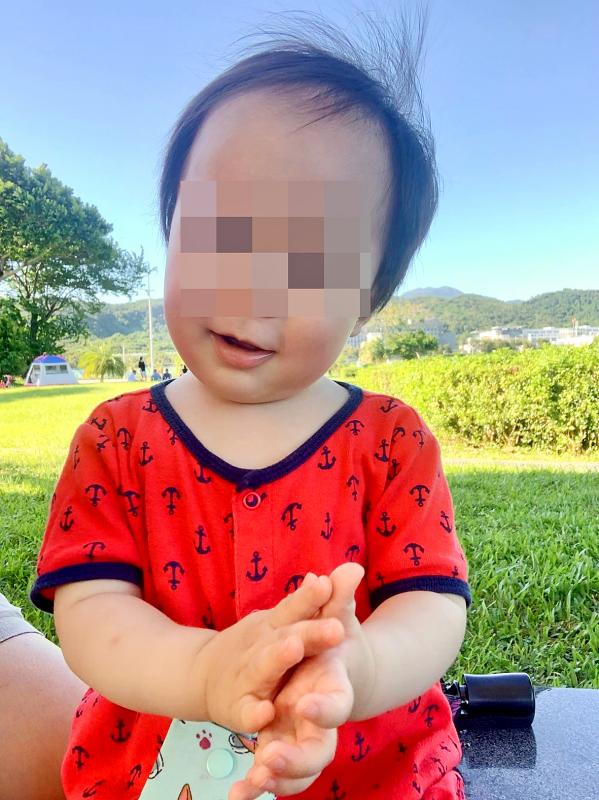The father of a two-year-old boy who last month died of COVID-19 yesterday asked why it took more than an hour to find an ambulance to take his son to a hospital, saying the delay led to his son’s death.
“What exactly happened during those 81 minutes?” he wrote on Facebook.
The boy died on April 19 following six days of treatment in an intensive care unit at Shuang Ho Hospital in New Taipei City’s Jhonghe District (中和).

Photo: Lai Hsiao-yung, Taipei Times
He was the first child in Taiwan to die of COVID-19 since the pandemic began in 2020.
Attributing the cause of the child’s death to the rapid deterioration of his condition after he developed severe symptoms, the hospital said at the time that he died of brain stem encephalitis resulting from septicemia triggered by COVID-19.
Prior to the boy’s death, nobody under 30 had died of COVID-19 complications in Taiwan.

Photo courtesy of EnEn’s family
“After En En [恩恩, the boy’s name] tested positive for the disease with a high fever, we repeatedly called the Jhonghe District Public Health Center, but the call was never answered. We called the New Taipei City Fire Department, which asked us to get approval from the health center first, and then dialed 119 four times before an ambulance was dispatched,” the father said. “We waited 81 minutes for the ambulance to come, and that was the hardest and longest time in our lives.”
“Recalling the situation, we were utterly hopeless and as his father I feel great regret and heartbreak,” he said. “I want the authorities to tell us the truth. Why it took 81 minutes for the ambulance to come, and why En En was only able to get to the hospital 91 minutes later.”
The father said he and his wife have sent an application to the New Taipei City Government, the Centers for Disease Control, Jhonghe health center and the 1922 hotline, asking them to release the call records.
In response to media queries yesterday, New Taipei City Mayor Hou you-yi (侯友宜) refrained from commenting, saying only that “every life must be treasured and everything possible must be done to prevent such a tragedy from happening again.”
New Taipei City Department of Health Director Chen Ran-chou (陳潤秋) said “everything that should have been done was done,” and the ambulance was dispatched in accordance with Communicable Disease Control Act (傳染病防治法) guidelines.
Minister of Health and Welfare Chen Shih-chung (陳時中), who heads the Central Epidemic Command Center, yesterday said that recordings of 1922 hotline calls are preserved for a year, and an applicant should present their ID to access the recordings.

US President Donald Trump said "it’s up to" Chinese President Xi Jinping (習近平) what China does on Taiwan, but that he would be "very unhappy" with a change in the "status quo," the New York Times said in an interview published yesterday. Xi "considers it to be a part of China, and that’s up to him what he’s going to be doing," Trump told the newspaper on Wednesday. "But I’ve expressed to him that I would be very unhappy if he did that, and I don’t think he’ll do that," he added. "I hope he doesn’t do that." Trump made the comments in

NOT AN OPENING: Trump’s violation of international law does not affect China’s consideration in attacking Taiwan; Beijing lacks capability, not precedent, an official said Taiwanese officials see the US’ capture of the president of Venezuela as a powerful deterrent to Beijing’s aggression and a timely reminder of the US’ ability to defeat militaries equipped with Chinese-made weapons. The strikes that toppled Venezuelan President Nicolas Maduro signaled to authoritarian leaders, including Chinese President Xi Jinping (習近平), US President Donald Trump’s willingness to use military might for international affairs core to US interests, one senior official in Taipei’s security circle said. That reassured Taiwan, the person said. Taipei has also dismissed the idea that Trump’s apparent violation of international law could embolden Beijing, said the official, who was not

A cold surge advisory was today issued for 18 cities and counties across Taiwan, with temperatures of below 10°C forecast during the day and into tonight, the Central Weather Administration (CWA) said. New Taipei City, Taipei, Taoyuan and Hsinchu, Miaoli and Yilan counties are expected to experience sustained temperatures of 10°C or lower, the CWA said. Temperatures are likely to temporarily drop below 10°C in most other areas, except Taitung, Pingtung, Penghu and Lienchiang (Matsu) counties, CWA data showed. The cold weather is being caused by a strong continental cold air mass, combined with radiative cooling, a process in which heat escapes from

Snow this morning fell on Alishan for the first time in seven years, as a strong continental cold air mass sent temperatures plunging across Taiwan, the Central Weather Administration (CWA) said. The Alishan weather station, located at an elevation of about 2,200m in central Taiwan, recorded snowfall from 8:55am to 9:15am, when the temperature dropped to about 1°C, the CWA said. With increased moisture and low temperatures in the high-altitude Alishan area, the conditions were favorable for snow, CWA forecaster Tsai Yi-chi (蔡伊其) said. The last time snow fell at the Alishan weather station was on Jan. 10, 2018, while graupel fell there